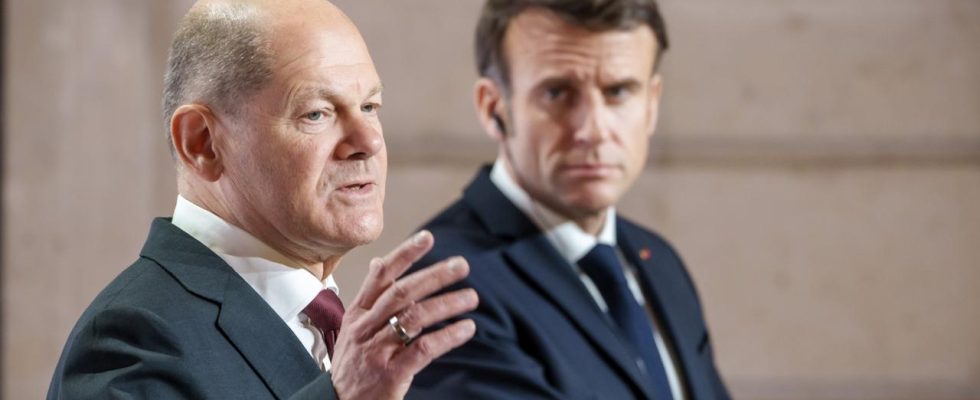First the no to “Taurus”, now the rejection of Western ground troops: After French President Macron’s initiative, German politicians are once again drawing clear limits for support for Ukraine.
Chancellor Olaf Scholz’s diary today includes appointments beyond the big stage: a visit to the German Diary Archive in Emmendingen, for example, or to the SC Freiburg football club. However: If the Chancellor doesn’t come to world politics, then it will come to him. After Emanuel Macron’s thoughts about Western troops for Ukraine, Scholz explains what was and continues to be unchangeable for him, “namely that there will be no ground troops, no soldiers on Ukrainian soil that will be sent there by European states or NATO states. ”
Let alone German soldiers. Just yesterday, Scholz confirmed: That won’t happen. That’s what he stands for. Ultimately, there is a fundamental difference: whoever supplies weapons helps Ukraine defend itself against Russian attack. Anyone who sends soldiers becomes a war party themselves. But the Chancellor rules that out.
No German “boots on the ground”
The astonishment at Macron’s statements extends across Europe – whether in Hungary, the Czech Republic or Poland, in Italy and Sweden or at NATO headquarters. Defense Minister Boris Pistorius gives a basic answer to the question about German soldiers for Ukraine. “Yes, I rule that out, that was the German position from the start.” And in order to leave no shadow of a doubt, let me be clear again: “‘Boots on the ground’ is not an option for the Federal Republic of Germany.”
Pistorius expressly thanks NATO Secretary General Jens Stoltenberg for ensuring clarity. A clear “no” from the government. But even if she wanted to send soldiers, it would need a majority in the Bundestag. After all, Germany has a parliamentary army.
Red lines remain
How often has the Chancellor been compelled in the Ukraine debates – just think of the Taurus cruise missile or the Leopard tank. This time, however, the opposition and traffic light partners are joining the Chancellor and ruling out the deployment of their own troops. This also applies to the Green European politician Anton Hofreiter, who otherwise likes to criticize the Chancellor often. Clear words, however, when it comes to the ground troops debate. He finds it completely unnecessary, it only scares the population.
For the opposition, CSU defense politician Florian Hahn on “Welt TV” sees it the same way. “In fact, this is of course still a red line.” CDU foreign politician Roderich Kiesewetter says so ARD capital studio, Ukraine needs, above all, long-range weapons and ammunition. If Europe finally delivers, then the question of ground troops will no longer arise.
For Green Party leader Omid Nouripour, it is no longer an issue; for him, all of this is simply “not an issue.” SPD foreign policy expert Michael Roth speaks of a phantom debate. Roth tells him that he spoke to many experts on his trips to Ukraine and that none of them were demanding ground troops ARD capital studio.
CDU politician Serap Güler believes that Macron has overstepped his bounds and that this is not good for the German debate. SPD parliamentary group leader Rolf Mützenich adds: “Statesmanship does not consist in pithy words, but rather in concrete support.”
Shown off, uncoordinated, weak
So we regret that we are distracting from the actual topic: more and faster arms deliveries. Scholz is pushing this with his European partners, including France. The Paris conference was actually announced as a sign of European unity – nothing remains of that the day after, says Green politician Hofreiter. Macron has distracted from the essentials, and all of this “just shows again that the Europeans are uncoordinated and weak.”
Germany is being shown off by France, that’s how CSU politician Hahn sees it. CDU foreign policy expert Kiesewetter takes it even further: In his opinion, German-French relations have never been as bad as they are today. There is a lack of “leadership in partnership”.
Purposeful ambiguity? But why is the French president making such an advance? Macron himself calls this “strategic ambiguity” and what he means is not wanting to let anyone see his cards. Anything is possible that helps to achieve the goals: That would then also be a signal to Russia that it cannot be sure of any reaction. The day after, however, there is hardly anything left of this ambiguity. Instead, what is remembered most is a French president who touched on a taboo.
Dietrich Karl Mäurer, ARD Berlin, tagesschau, February 27, 2024 5:42 p.m

